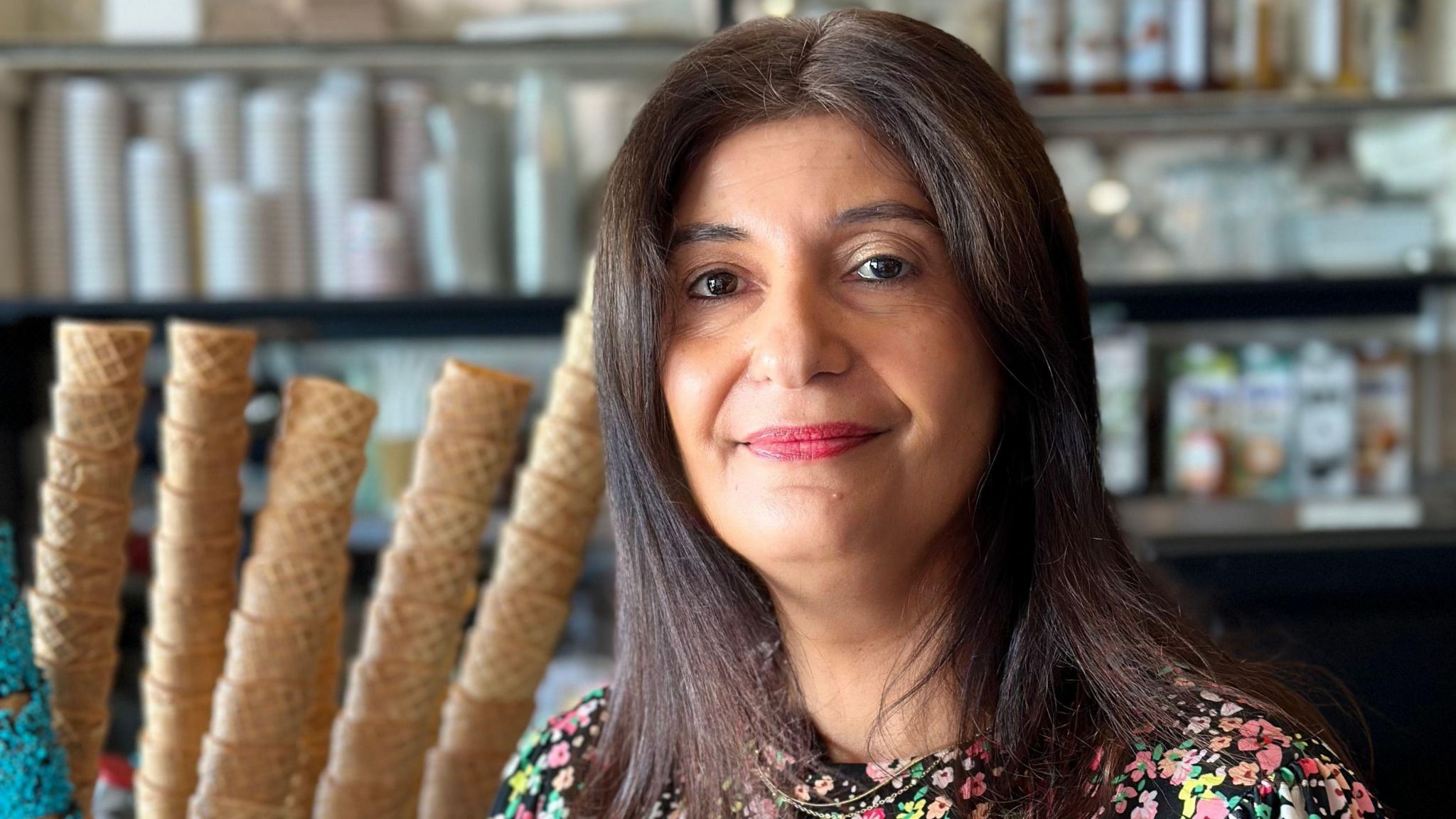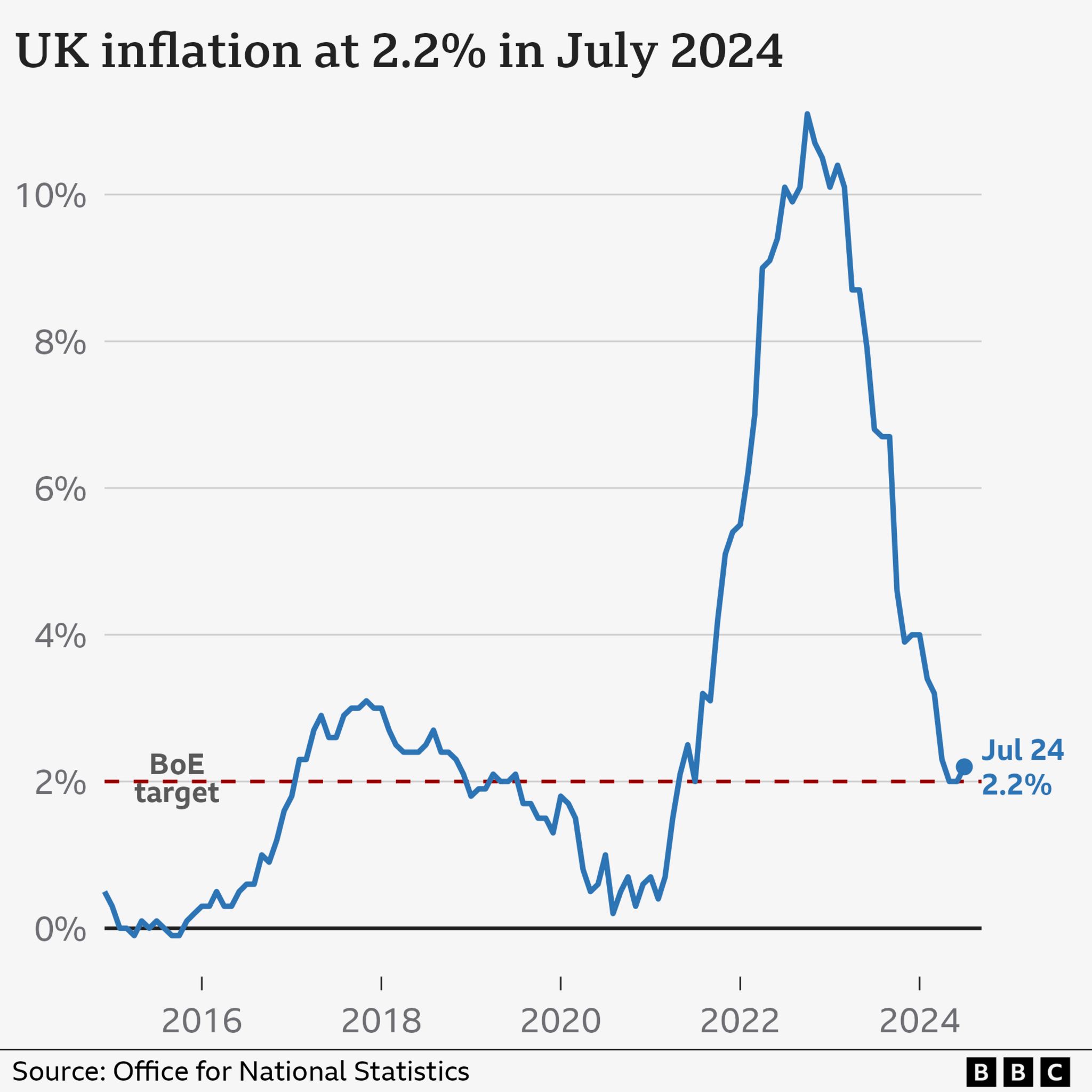Inflation rate rises for first time this year to 2.2%

The UK’s inflation rate has risen for the first time this year, official figures show.
Overall prices rose by 2.2% in the year to July, slightly above the Bank of England’s target of 2% where the rate had been since May.
A rise was widely predicted and is due to prices of gas and electricity falling by less than they did a year before. The increase is also less than many economists had expected.
The latest figures mean that prices are now rising faster across the UK than in previous months, but still at a slower pace than in 2022 and 2023 when households were hit especially hard by higher energy and food bills.
-
How quickly are prices rising in the UK?
-
3 hours ago
-
-
When will mortgage rates come down?
-
3 hours ago
-
The Bank of England expects inflation – which measures the rate at which prices rise – to go up to 2.75% in the coming months before falling below 2% next year.
Another set of inflation figures, as well as employment and wages data, will be released before its next rate-setting meeting on 19 September.
The Bank had put up interest rates to tackle soaring inflation but last month cut them to 5% from 5.25% – the first reduction since the start of the pandemic.
Higher rates can be good for savers but may drive up the cost of mortgages and other loans for consumers.
‘September cut not off the table’
Experts have been predicting further cuts this year, with investors now raising their bets that the Bank will opt for a cut in September.
Sanjay Raja, chief UK economist at Deutsche Bank Research, said: “A September rate cut should no longer be off the table. And it’s entirely conceivable to think that we could get multiple more rate cuts this year.”
However, Debapratim De, director of economic research at Deloitte, said the latest figures were “unlikely to materially alter the Bank’s thinking on interest rates”.
The Bank also looks at inflation in the services sector, for example, when deciding on rates.
While prices in this sector slowed to 5.2% in July, this was partly attributed to airfares and hotel stays which can be quite volatile.
Mr De added: “We expect rates to be kept on hold in September, but two further cuts remain likely this year.”

Interest rate cuts could be good news for businesses, which have been dealing with higher rates and surging inflation over the last few years.
Livia Marrocco, owner of Marrocco’s restaurant and ice cream shop in Hove, told the BBC: “Products have gone up. Ingredients have gone up. We have put prices up slightly.”
However, she said that things have been looking up recently as the good weather and school holidays were bringing in more customers.
Inflation surged to 11.1% in the wake of the Ukraine war and pandemic-related supply chain crunches, driving up the cost of living for millions.
But it had been steadily falling until June, as the Bank of England increased interest rates to dampen consumer demand.
Grant Fitzner, chief economist at the Office for National Statistics (ONS), said: “Inflation ticked up a little in July as although domestic energy costs fell, they fell by less than a year ago.
“This was partially offset by hotel costs, which fell in July after strong growth in June.”

Mr Fitzner also told the BBC’s Today programme on Wednesday that “under the bonnet” price rises remained under control, with services inflation down in July and food prices unchanged.
“This still suggests that inflation pressures at least in the short run are fairly moderate,” he said.
According to the Institute for Fiscal Studies think tank, food and drink prices surged by 28.4% between September 2021 and September 2023.
Its latest analysis suggested that less well-off households saw their food bill rise by far more than those with higher incomes, as the sharpest price increases had been applied to cheaper brands.
But in July, food price inflation had settled down to just 1.5%, according to the ONS.
Darren Jones, chief secretary to the Treasury, said that the new Labour government is “under no illusion” about the challenges still facing households.
But shadow chancellor Jeremy Hunt said that the new figures show that there is “more to be done to keep inflation down”.
The prospect that further falls in interest rates will reduce the cost of borrowing could create a pick-up in activity in the housing market.
Separate figures published by the ONS on Wednesday show that house prices have been rising, although the data pre-dates August’s cut in interest rates.
UK property prices rose by 2.7% in the year to the end of June, the ONS said.
In England, an increase of 2.4% pushed the average house price above £300,000.
The increase of £7,000 in the year meant the cost of an average home in England stood at £305,000, compared with £216,000 in Wales, £192,000 in Scotland, and £185,000 in Northern Ireland.

How can I save money on my food shop?
Look at your cupboards so you know what you have already
Head to the reduced section first to see if it has anything you need
Buy things close to their best before date which will be cheaper and use your freezer
Read more tips here
Related Topics
- Economics
- Inflation
- Cost of Living
- UK economy
- Bank of England
- Office for National Statistics
Published at Wed, 14 Aug 2024 10:25:29 +0000